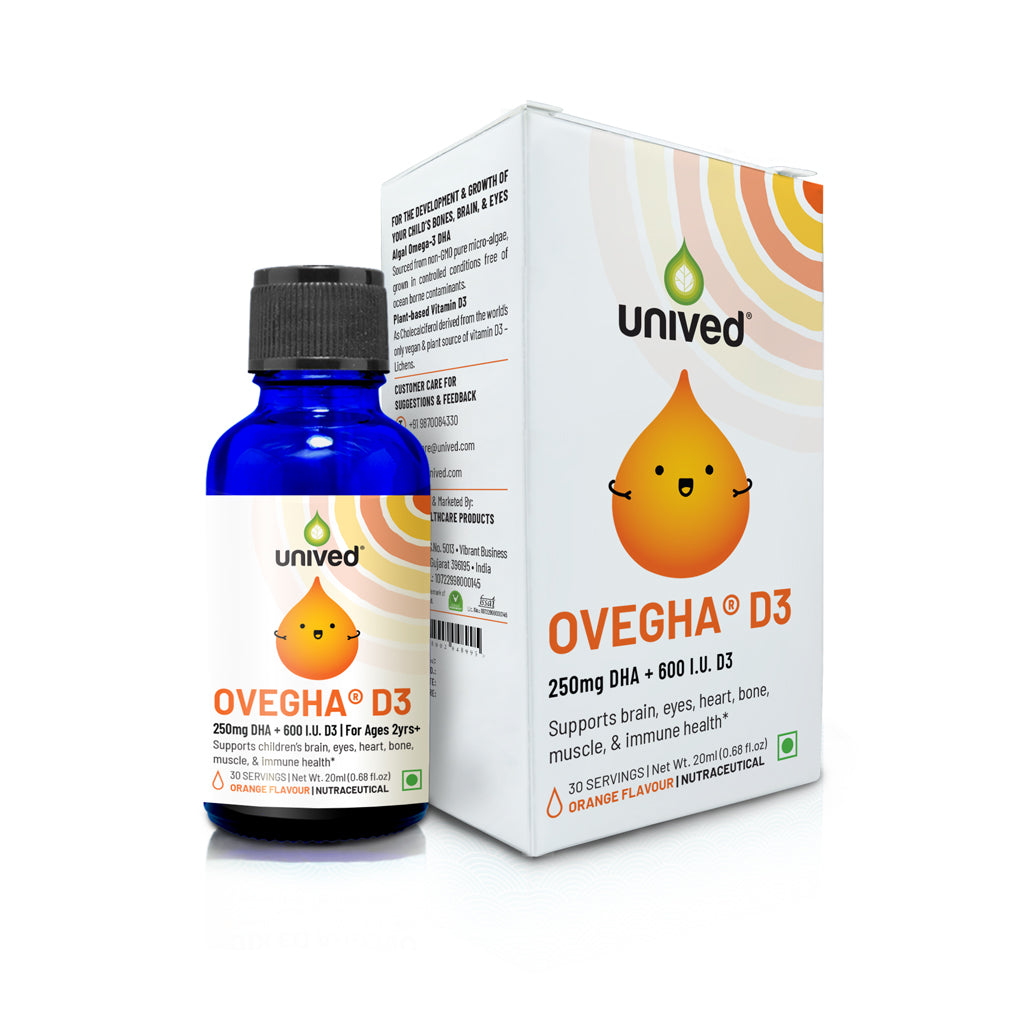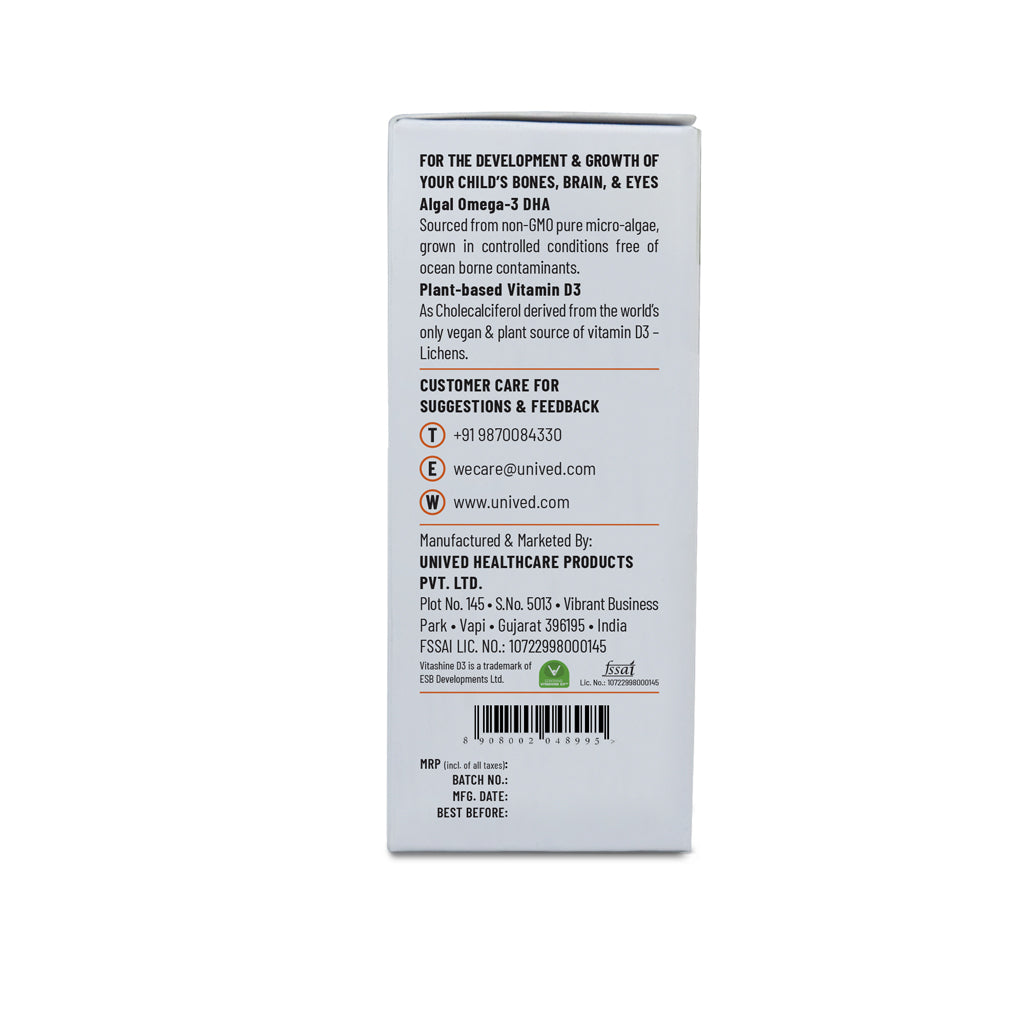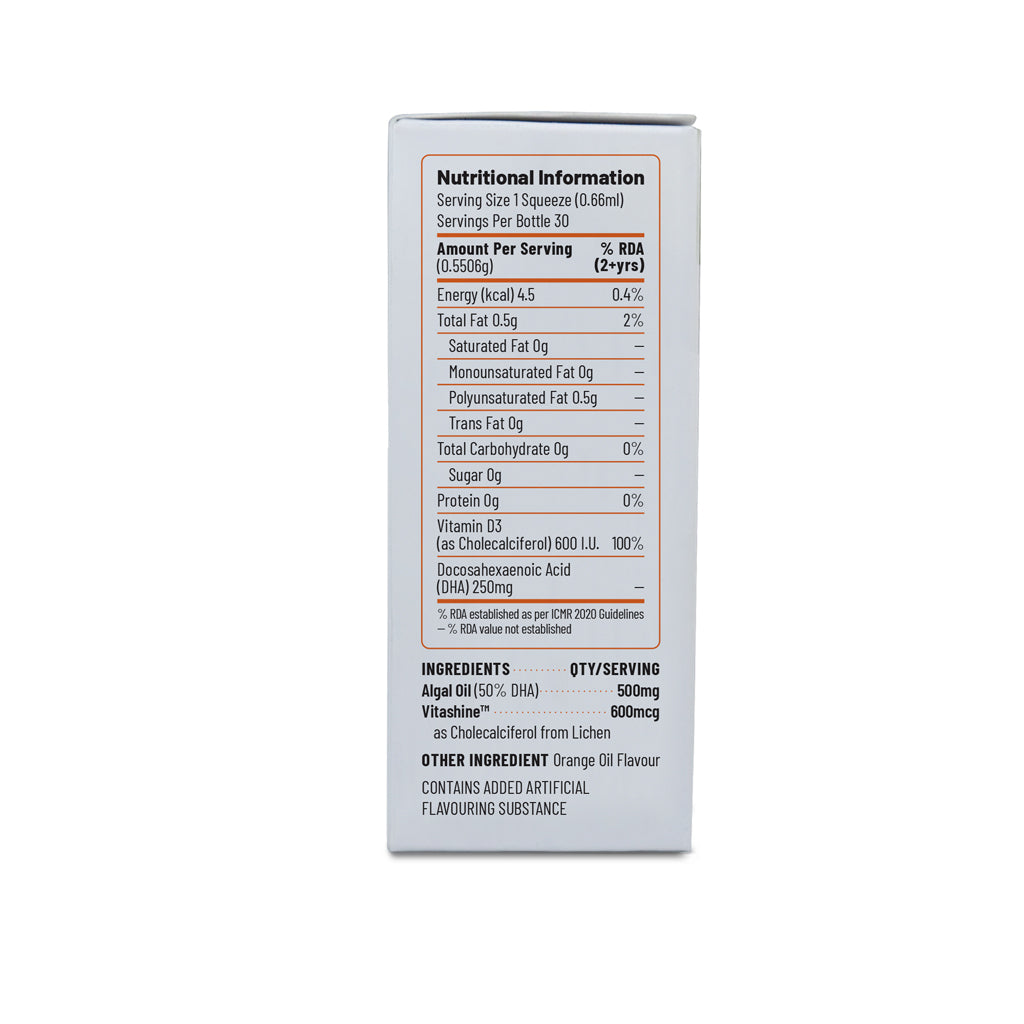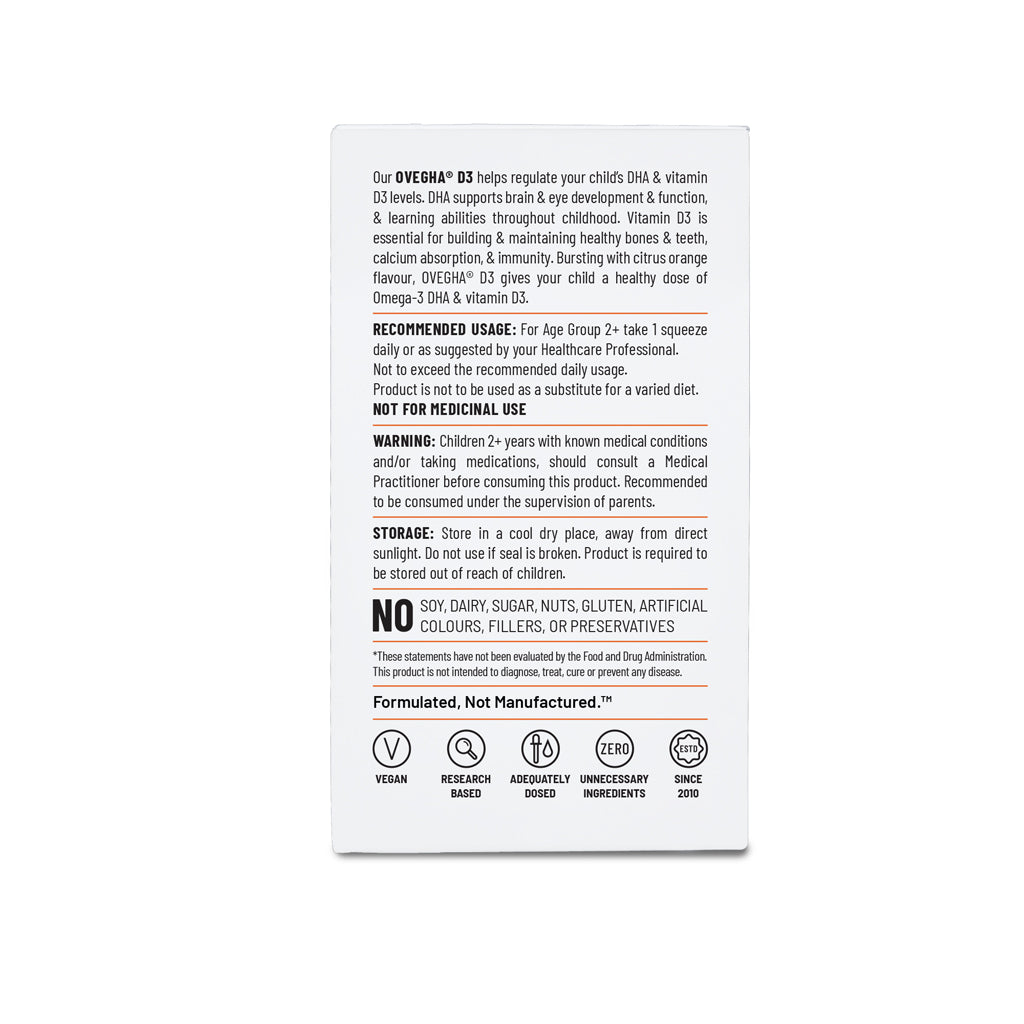DHA
Ovegha D3 Kids
Ovegha D3 Kids
Couldn't load pickup availability
Key Benefits
- Normal and optimal development of the brain and eyes.
- Helps develop mental focus and supports neurological functioning.
- Helps promote nervous system development and optimal memory function.
- Improvements in cognition and behavior.
- Building and maintenance of healthy bones.
- Increases and facilitates intestinal calcium absorption.
- Supports the immune system.
Batch Details
Serving Size & Servings Per Container
Suggested Use
Certificate Of Analysis
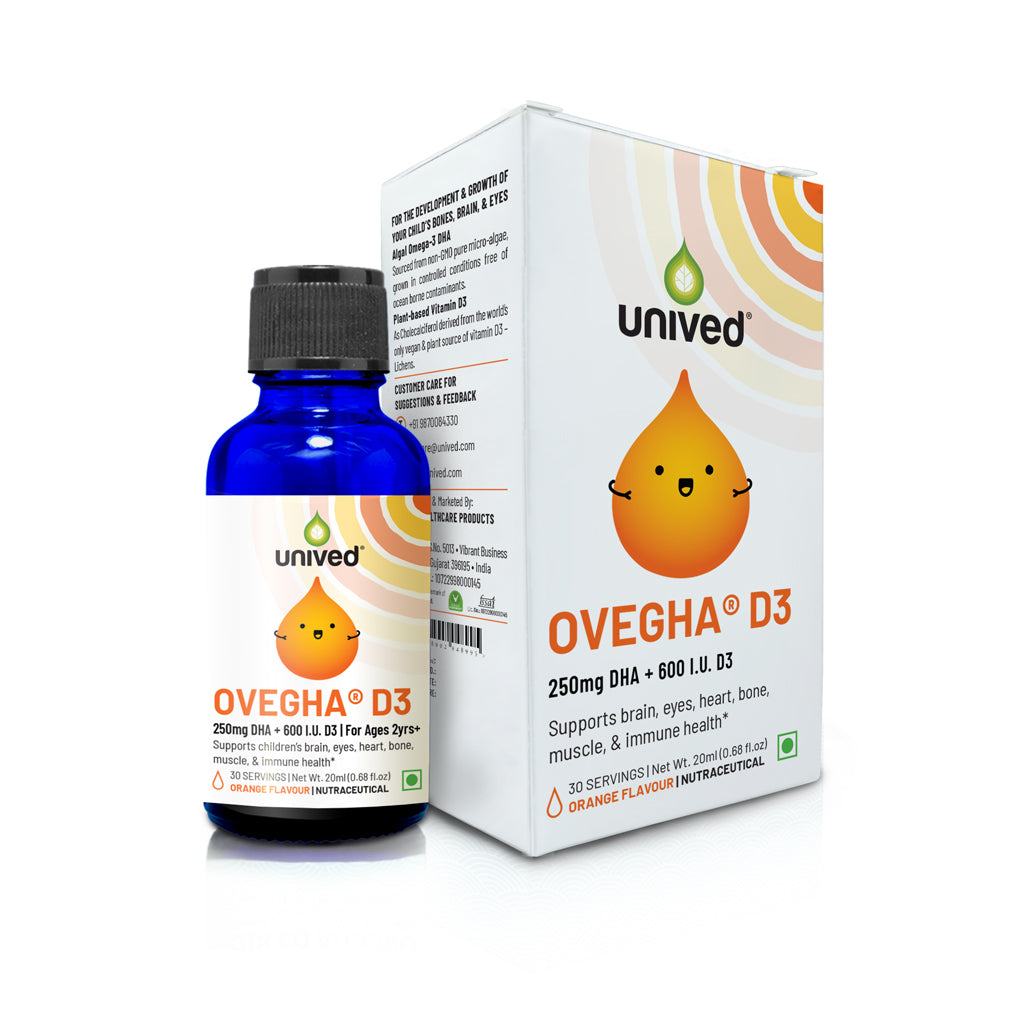
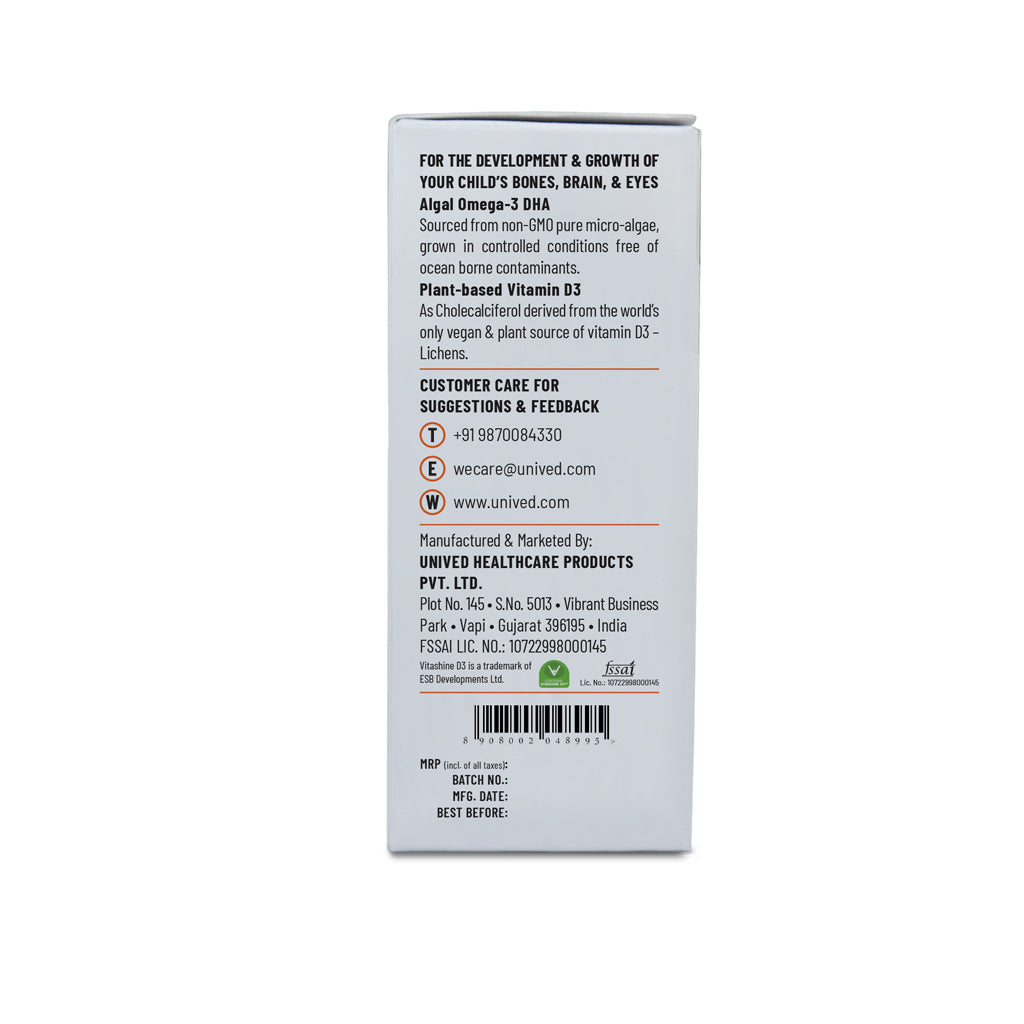
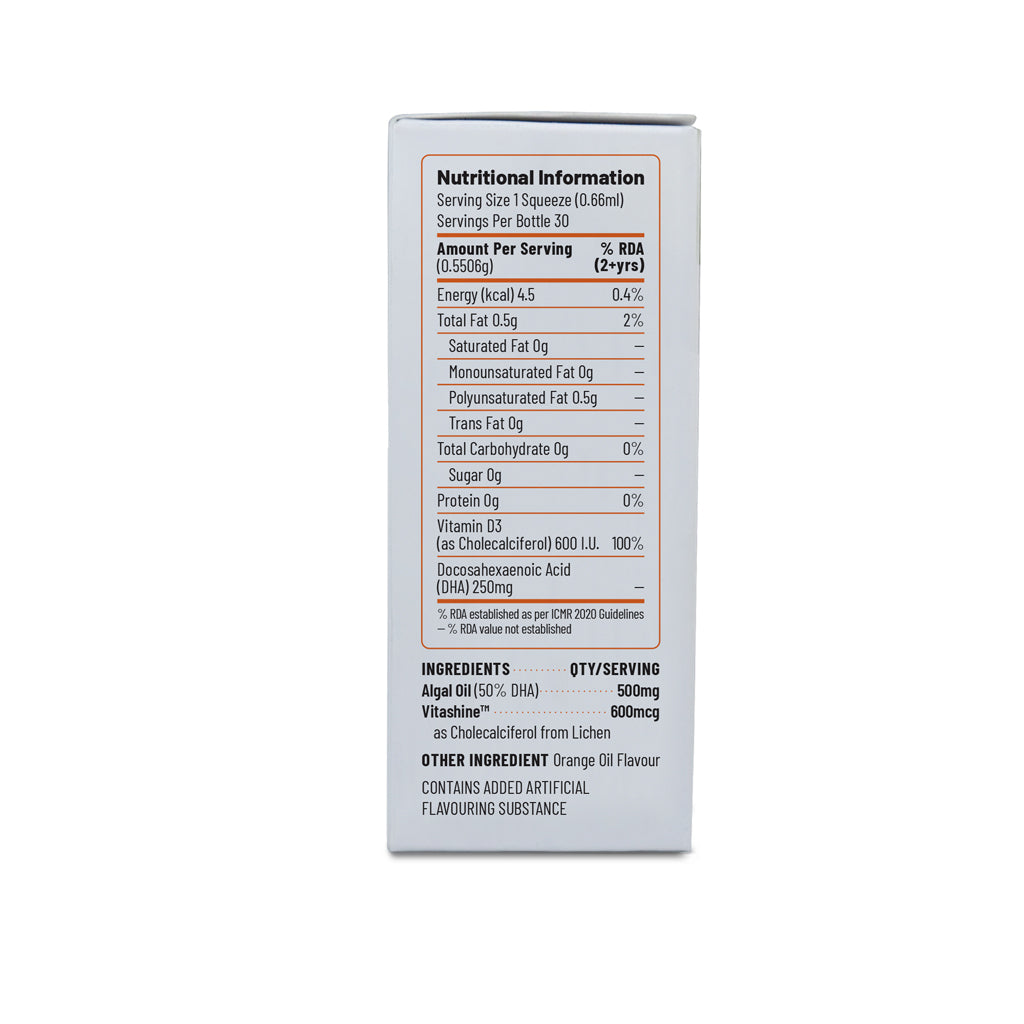
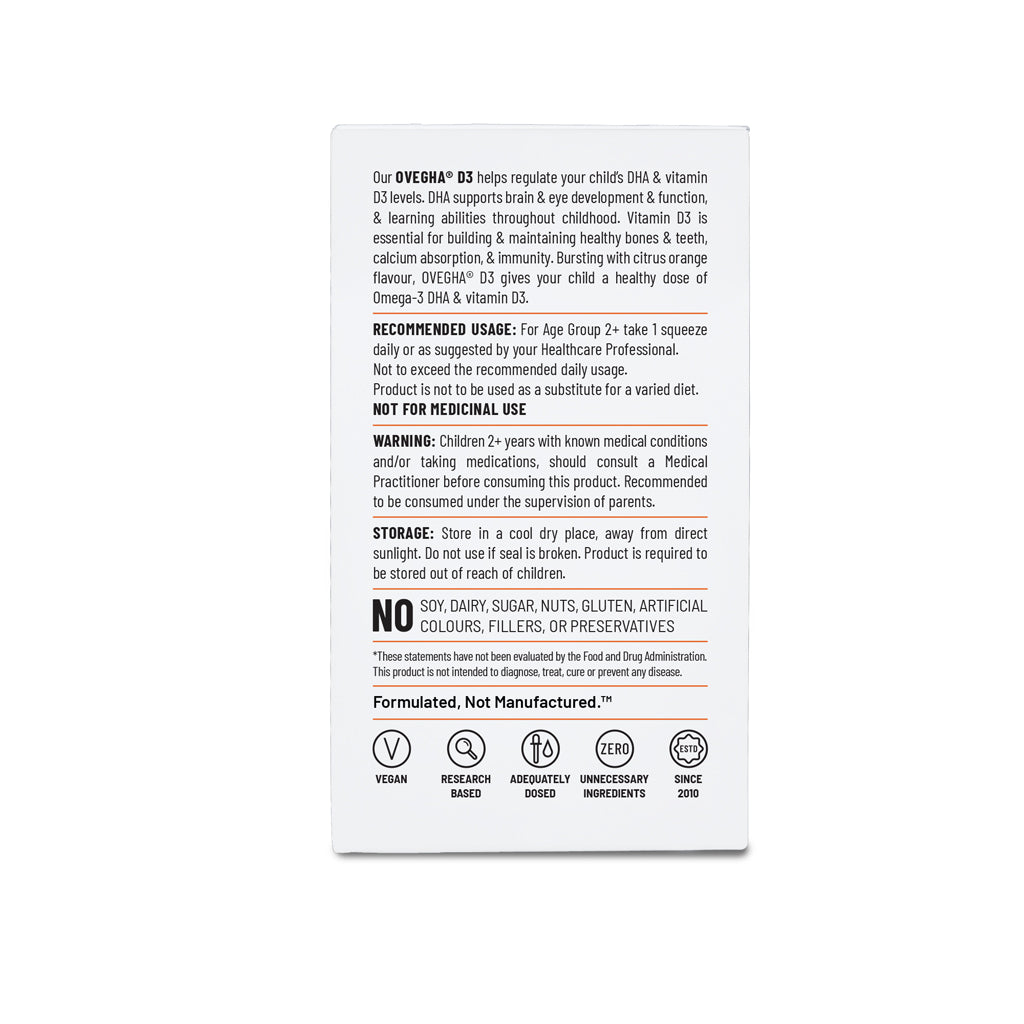
- Learn More
- Ingredients
- FAQ
Vitamin D in Children plays an important role in supporting
calcium homeostasis and bone growth. Vitamin D also has an impact on the innate
immune system to prevent infections and the adaptive immune system to modulate
autoimmunity. Studies support vitamin D on brain development and behavior and
mental health.
Vitamin D deficiency in children can have adverse health
effects like D deficiency associated with bone diseases such as rickets, and
osteomalacia. In India, approximately 490 million people are vitamin D
deficient of which 31% are children and adolescents [7]. A recent, multi-center
study in India indicates that more than half the Indian children/adolescents
were vitamin-D deficient or insufficient [6]. With the high prevalence of
vitamin D deficiency described in the pediatric population and the known importance
of calcium in bone mineralization during this critical time of growth,
reinstates that vitamin D supplementation is of paramount importance.
Docosahexaenoic acid (DHA) is an important structural
constituent of membranes specifically in the brain and eye. DHA makes up 30% of
the brain and 50% of the retina’s structure. Its accumulation in the fetal
brain takes place mainly during the last trimester of pregnancy and continues
at very high rates up to the end of the second year of life [1]. In infants,
DHA is important for optimal visual and cognitive development. DHA is vital for
the myelination of frontal lobes and their development. DHA-rich frontal lobes
are thought to be responsible for executive and higher-order cognitive
activities such as planning, problem-solving, and focused attention [2].
The usual intake of DHA among toddlers and children is low
and the endogenous formation of DHA also seems to be relatively low. Some
studies show improvements in cognition and behavior as the result of
supplementation with DHA [2].
Indian children are often found to be deficient in vitamins,
micro-nutrients, and protein – but what about DHA in Kids? DHA has emerged as a
front-line nutrient as it plays an integral part in the development and
functionality of the brain, eyes, and heart. Its supplement is extremely
important to ensure the healthy development of your child’s brain and eyes.
There is a raft of research confirming the role of DHA in
IQ, memory, learning, behavior, mood, and eyesight, among various other
benefits – outlining supplementation as perhaps the single most important
nutrient during the growth of your child.
Our Formulation
Ovegha D3 Kids is a plant-based DHA (250mg) derived from
microalgae and a plant-based Vitamin D3 (600 I.U.) derived from Lichens.
Mode of Action:
1. DHA (Docosahexaenoic acid):
- The developing brain or hippocampal neurons take up DHA and
incorporates it into membrane phospholipids resulting in neurite outgrowth,
synaptogenesis, and neurogenesis. DHA enhances synaptic plasticity by
increasing synaptic protein expression, dendritic spine density, long-term
potentiation, and neurogenesis in the hippocampus for learning and memory
processing [5]. - Enhances dendritic spine levels and cognitive functions [5].
- DHA is necessary for the proper formation of phospholipids
which are an essential component of the cell membrane [5]. - Regeneration of rhodopsin [8].
- Significantly increase cellular choline uptake in human
retinal cells [9]. - Increase the fluidity of cell membranes and improves their
ability to release neurotransmitters, therefore, promoting cell signaling.
2. Vitamin D3:
- Stimulates protein expression in the intestinal wall to
promote calcium absorption [4]. - Promotes mineralization of the collagen matrix in bone [11].
- Activates the transcription of tryptophan hydroxylase-2, an
enzyme that converts tryptophan to serotonin (the hormone responsible for
social behaviour) in the brain [10]. - Acts as an immune modulator and modulates innate and
adaptive immunity [11].
References:
1. Lauritzen, Lotte, et al. "DHA effects in brain
development and function." Nutrients 8.1 (2016): 6.
2. Kuratko, Connye N., et al. "The relationship of
docosahexaenoic acid (DHA) with learning and behavior in healthy children: a
review." Nutrients 5.7 (2013): 2777-2810.
3. Taylor, Sarah N. "Vitamin D in toddlers, preschool
children, and adolescents." Annals of Nutrition and Metabolism 76.2
(2020): 30-41.
4. Casey, Catherine, David C. Slawson, and Lindsey R. Neal.
"Vitamin D supplementation in infants, children, and adolescents."
American family physician 81.6 (2010): 745-748.
5. Tanaka, Kazuhiro, et al. "Effects of docosahexaenoic
acid on neurotransmission." Biomolecules & therapeutics 20.2 (2012):
152-157.
6. Khadilkar, Anuradha, et al. "Vitamin D status and
determinants in Indian children and adolescents: A multicentre study."
Scientific Reports 12.1 (2022): 1-13.
7. Cashman, K. D., et al., in Khadilkar, Anuradha, et al.
"Vitamin D status and determinants in Indian children and adolescents: A
multicentre study." Scientific Reports 12.1 (2022): 1-13.
8. Querques, Giuseppe, Raimondo Forte, and Eric H. Souied.
"Retina and omega-3." Journal of nutrition and metabolism 2011
(2011).
9. Mun, Jonathan G., et al. "Choline and DHA in
maternal and infant nutrition: synergistic implications in brain and eye
health." Nutrients 11.5 (2019): 1125.
10. McClafferty, Hilary. "Pediatric Integrative
Medicine: An Emerging Field of Pediatrics." (2015).
11. Aranow C. Vitamin D and the immune system. J Investig
Med. 2011 Aug;59(6):881-6. doi: 10.2310/JIM.0b013e31821b8755. PMID: 21527855;
PMCID: PMC3166406.
Active Ingredients per Serving (1 Squeeze - 0.66mI)
- Algal Oil (50% DHA) – 500mg
- Vitamin D3 (Vitashine™) as Cholecalciferol from Lichen – 600mcg
Flavour - Orange Flavour.
Other Ingredient - Orange Oil Flavour
What is the suggested use of Ovegha D3 Kids?
As a dietary supplement. Consume one serving at night before bed, or as directed by your physician. OVEGHA D3 Kids can also be added to the kids’ favorite beverage. One serving offers 250mg DHA + 600 I.U. of D3 every day. Safe for children aged 2 and above.
very good for childrens mental development
Good and Safe Supplement for kids and sportspersons, my kids were low on D3. But now there parameters are within the range after they started taking Univeds Ovegha D3 now they are just in The maintenance dose
Good to order from Unived website for faster delivery and genuine product
Unived Ovegha D3 Kids
Nice ovegha dh3 formula for kids .I like and I ask for the peaple of India to make their baby healthy nd use only Indian top brand ..
good product, but quantity of med seems lesser when compared to dosage and price.

